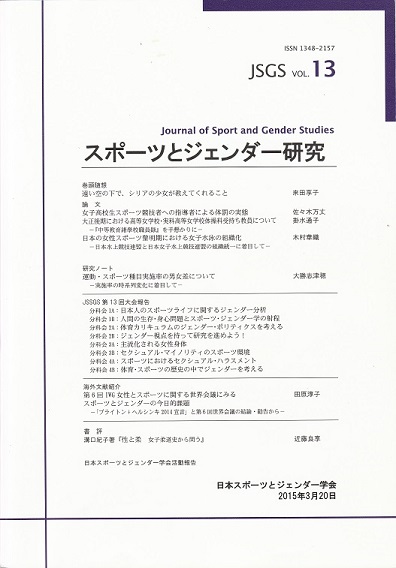3 巻
選択された号の論文の21件中1~21を表示しています
- |<
- <
- 1
- >
- >|
巻頭随想
-
2005 年 3 巻 p. 2-3
発行日: 2005年
公開日: 2023/06/23
PDF形式でダウンロード (390K)
論文
-
2005 年 3 巻 p. 4-17
発行日: 2005年
公開日: 2023/06/26
PDF形式でダウンロード (2723K) -
2005 年 3 巻 p. 18-25
発行日: 2005年
公開日: 2023/06/26
PDF形式でダウンロード (1483K) -
2005 年 3 巻 p. 26-41
発行日: 2005年
公開日: 2023/06/26
PDF形式でダウンロード (3116K)
研究ノート
-
2005 年 3 巻 p. 42-52
発行日: 2005年
公開日: 2023/06/26
PDF形式でダウンロード (2082K) -
2005 年 3 巻 p. 53-64
発行日: 2005年
公開日: 2023/06/26
PDF形式でダウンロード (2557K)
JSSGS第3回大会報告
講演まとめ
-
2005 年 3 巻 p. 65-67
発行日: 2005年
公開日: 2023/06/26
PDF形式でダウンロード (865K)
シンポジウム
-
2005 年 3 巻 p. 68-70
発行日: 2005年
公開日: 2023/06/26
PDF形式でダウンロード (467K) -
2005 年 3 巻 p. 70-72
発行日: 2005年
公開日: 2023/06/26
PDF形式でダウンロード (503K) -
2005 年 3 巻 p. 72-74
発行日: 2005年
公開日: 2023/06/26
PDF形式でダウンロード (513K) -
2005 年 3 巻 p. 74-77
発行日: 2005年
公開日: 2023/06/26
PDF形式でダウンロード (609K)
ワークショップ
-
2005 年 3 巻 p. 78-80
発行日: 2005年
公開日: 2023/06/26
PDF形式でダウンロード (471K) -
2005 年 3 巻 p. 80-82
発行日: 2005年
公開日: 2023/06/26
PDF形式でダウンロード (467K) -
2005 年 3 巻 p. 82-84
発行日: 2005年
公開日: 2023/06/26
PDF形式でダウンロード (469K) -
2005 年 3 巻 p. 85-87
発行日: 2005年
公開日: 2023/06/26
PDF形式でダウンロード (655K) -
2005 年 3 巻 p. 87-88
発行日: 2005年
公開日: 2023/06/26
PDF形式でダウンロード (388K) -
2005 年 3 巻 p. 89-91
発行日: 2005年
公開日: 2023/06/26
PDF形式でダウンロード (820K)
共催講演会要旨
-
2005 年 3 巻 p. 92-93
発行日: 2005年
公開日: 2023/06/26
PDF形式でダウンロード (458K)
海外文献紹介
-
2005 年 3 巻 p. 94
発行日: 2005年
公開日: 2023/06/26
PDF形式でダウンロード (145K) -
2005 年 3 巻 p. 95-112
発行日: 2005年
公開日: 2023/06/26
PDF形式でダウンロード (4230K)
書評
-
2005 年 3 巻 p. 113-114
発行日: 2005年
公開日: 2023/06/26
PDF形式でダウンロード (421K)
- |<
- <
- 1
- >
- >|
